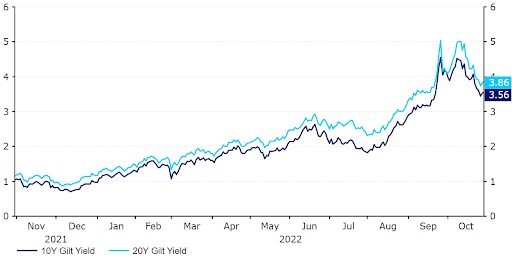We believe that this week’s Bank of England meeting is one of the hardest to call for some time, and expect volatility in the pound to be elevated during either side of the decision.The disastrous mini-budget announcement, which jolted UK financial markets in September, has created a great deal of uncertainty heading into Thursday’s meeting. In the immediate aftermath of the budget, expectations for BoE interest rate hikes went into overdrive. At one stage, investors were bracing for an emergency rate increase and swap markets were fully pricing in 135 basis points of hikes by the November meeting. Since then, the situation has improved dramatically. Most of the mini-budget tax cuts are now gone, as is Liz Truss, replaced in Number 10 by former chancellor Rishi Sunak. This has helped calm financial markets, leading to a sharp recovery in sterling (to back above the $1.15 level) and an easing in gilt yields (the 10-year yield, for instance, is now back below 3.6%).Figure 1: UK 10Y & 20Y Gilt Yields (2021 - 2022) Speaking in mid-October, Bank of England chief economist Pill warned that a ‘significant’ rate increase was on the way in November. These remarks were, however, before the dramatic budget U-turn, which will have significantly altered the bank’s view on UK inflation. One of the biggest issues of the budget was the perceived impact of the tax cuts on consumer price growth, which was expected to remain above the BoE’s target for longer than previously anticipated. But with most of these tax cuts now gone, and the government’s household energy bill freeze set to run for only six months, rather than two years, we see a significant easing in pressure on the MPC to tighten policy aggressively at upcoming meetings.Heading into Thursday’s meeting, market expectations have eased materially, and swaps are now only pricing in a 75 basis point interest rate hike, though this would still be the largest in more than three decades, and a base rate of around 5% in mid-2023. As we have said since the mini-budget announcement, we believe that it may be difficult for the MPC to meet these lofty expectations in the coming months. We think that even in the event of a 75bp rate hike this week, sterling could sell-off should the bank signal a more gradual pace of tightening ahead. In our view, the reaction in the pound following Thursday’s meeting will be highly dependent on the below.
Speaking in mid-October, Bank of England chief economist Pill warned that a ‘significant’ rate increase was on the way in November. These remarks were, however, before the dramatic budget U-turn, which will have significantly altered the bank’s view on UK inflation. One of the biggest issues of the budget was the perceived impact of the tax cuts on consumer price growth, which was expected to remain above the BoE’s target for longer than previously anticipated. But with most of these tax cuts now gone, and the government’s household energy bill freeze set to run for only six months, rather than two years, we see a significant easing in pressure on the MPC to tighten policy aggressively at upcoming meetings.Heading into Thursday’s meeting, market expectations have eased materially, and swaps are now only pricing in a 75 basis point interest rate hike, though this would still be the largest in more than three decades, and a base rate of around 5% in mid-2023. As we have said since the mini-budget announcement, we believe that it may be difficult for the MPC to meet these lofty expectations in the coming months. We think that even in the event of a 75bp rate hike this week, sterling could sell-off should the bank signal a more gradual pace of tightening ahead. In our view, the reaction in the pound following Thursday’s meeting will be highly dependent on the below. On the other hand, there are a handful of arguments to suggest that the majority may again vote for a smaller, 50bp hike. For starters, UK macroeconomic activity data has shown clear signs of a deterioration, and a technical recession looks highly likely on the way. Gilt yields also remain elevated, while sterling has recovered in trade-weighted terms, which could both discourage a larger hike. Moreover, the recent tax U-turns ensure that we are effectively back to where we were before the budget announcement, when the MPC appeared largely comfortable moving in 50bp increments.
On the other hand, there are a handful of arguments to suggest that the majority may again vote for a smaller, 50bp hike. For starters, UK macroeconomic activity data has shown clear signs of a deterioration, and a technical recession looks highly likely on the way. Gilt yields also remain elevated, while sterling has recovered in trade-weighted terms, which could both discourage a larger hike. Moreover, the recent tax U-turns ensure that we are effectively back to where we were before the budget announcement, when the MPC appeared largely comfortable moving in 50bp increments.
 Speaking in mid-October, Bank of England chief economist Pill warned that a ‘significant’ rate increase was on the way in November. These remarks were, however, before the dramatic budget U-turn, which will have significantly altered the bank’s view on UK inflation. One of the biggest issues of the budget was the perceived impact of the tax cuts on consumer price growth, which was expected to remain above the BoE’s target for longer than previously anticipated. But with most of these tax cuts now gone, and the government’s household energy bill freeze set to run for only six months, rather than two years, we see a significant easing in pressure on the MPC to tighten policy aggressively at upcoming meetings.Heading into Thursday’s meeting, market expectations have eased materially, and swaps are now only pricing in a 75 basis point interest rate hike, though this would still be the largest in more than three decades, and a base rate of around 5% in mid-2023. As we have said since the mini-budget announcement, we believe that it may be difficult for the MPC to meet these lofty expectations in the coming months. We think that even in the event of a 75bp rate hike this week, sterling could sell-off should the bank signal a more gradual pace of tightening ahead. In our view, the reaction in the pound following Thursday’s meeting will be highly dependent on the below.
Speaking in mid-October, Bank of England chief economist Pill warned that a ‘significant’ rate increase was on the way in November. These remarks were, however, before the dramatic budget U-turn, which will have significantly altered the bank’s view on UK inflation. One of the biggest issues of the budget was the perceived impact of the tax cuts on consumer price growth, which was expected to remain above the BoE’s target for longer than previously anticipated. But with most of these tax cuts now gone, and the government’s household energy bill freeze set to run for only six months, rather than two years, we see a significant easing in pressure on the MPC to tighten policy aggressively at upcoming meetings.Heading into Thursday’s meeting, market expectations have eased materially, and swaps are now only pricing in a 75 basis point interest rate hike, though this would still be the largest in more than three decades, and a base rate of around 5% in mid-2023. As we have said since the mini-budget announcement, we believe that it may be difficult for the MPC to meet these lofty expectations in the coming months. We think that even in the event of a 75bp rate hike this week, sterling could sell-off should the bank signal a more gradual pace of tightening ahead. In our view, the reaction in the pound following Thursday’s meeting will be highly dependent on the below.- Size of this Thursday’s rate hike
 On the other hand, there are a handful of arguments to suggest that the majority may again vote for a smaller, 50bp hike. For starters, UK macroeconomic activity data has shown clear signs of a deterioration, and a technical recession looks highly likely on the way. Gilt yields also remain elevated, while sterling has recovered in trade-weighted terms, which could both discourage a larger hike. Moreover, the recent tax U-turns ensure that we are effectively back to where we were before the budget announcement, when the MPC appeared largely comfortable moving in 50bp increments.
On the other hand, there are a handful of arguments to suggest that the majority may again vote for a smaller, 50bp hike. For starters, UK macroeconomic activity data has shown clear signs of a deterioration, and a technical recession looks highly likely on the way. Gilt yields also remain elevated, while sterling has recovered in trade-weighted terms, which could both discourage a larger hike. Moreover, the recent tax U-turns ensure that we are effectively back to where we were before the budget announcement, when the MPC appeared largely comfortable moving in 50bp increments.- Voting pattern among MPC members
- Signals on future monetary policy
- Updated GDP and inflation projections
















.svg)









.svg)




.svg)



